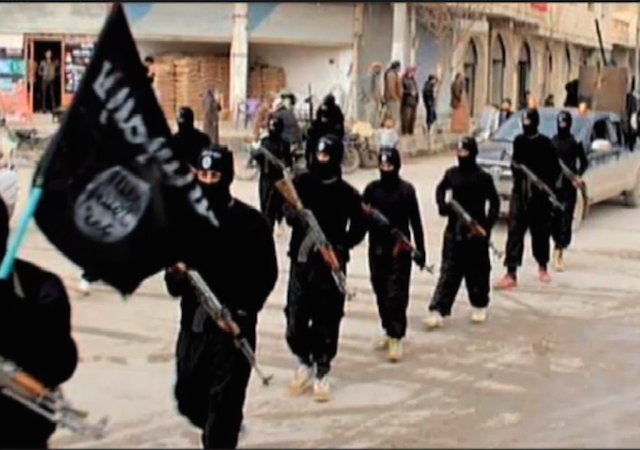
Even before the bloody beginning of July, U.S. defense authorities had at least one eye focused on Egypt’s Sinai peninsula—and now, they’re stepping in to make sure that ISIS doesn’t gain a more solid foothold in the region.
Late last week, a militant arm claiming loyalty to the Islamic State took responsibility for a missile attack on an Egyptian frigate in the Mediterranean. The group claims it used a missile to blow the ship up, but as Time magazine reports, that claim is disputed by Egyptian officials who have said that the frigate was merely set on fire and saw no loss of life.
SITE Intel Group posted pictures of the attack to Twitter:
Sinai Province of #ISIS claimed destroying a frigate of the Egyptian Navy in the Mediterranean Sea with a rocket. pic.twitter.com/3CuU7Gaqlt
— SITE Intel Group (@siteintelgroup) July 16, 2015
Footage, allegedly released by ISIS and showing the attack on the frigate, can be seen here.
The Sinai region has recently seen an uptick in violence, with this same ISIS offshoot claiming responsibility for a series of attacks that have taken lives and set local communities on edge. Earlier this month, simultaneous attacks on military checkpoints left 17 Egyptian soldiers dead and injured 30 others; the Egyptian military reported in the wake of the attacks that more than 100 jihadis lay dead following the tandem assaults, but this has done little to convince analysts that the insurgency that has been building over the past few years is on the run.
The July 11 attack on the Italian consulate in Cairo that killed one Egyptian only bolstered the theory that ISIS is not only becoming bolder, but branching out to hit its enemies’ international interests.
This past weekend, the insurgents launched similar attacks against new checkpoints in Sinai, killing at least 7 Egyptian soldiers. More via Fox News:
The statement from Brig. Gen. Mohammed Samir on Sunday said the military killed 59 militants during the day’s operations, which involved air cover.
The spokesman initially said that a shell struck a single checkpoint Saturday, killing three soldiers and wounding four. Security officials, speaking on condition of anonymity because they were not authorized to speak to journalists, said militants attacked two checkpoints.
The region which once served as a buffer zone between Egypt and Israel has now become a liability, the WSJ reports. From earlier this month:
Israeli analysts said last week’s onslaught near the border and rocket launches from Sinai into southern Israel aim to stir friction between Israel and Egypt by inviting retaliation. Any Israeli military incursion into the neighboring territory, however, risks exposing Egypt’s military weakness and straining their strategic alliance.
“We have an urgent interest in seeing the Egyptians win the war,” said Eli Shaked, a former Israeli ambassador to Egypt. “They must win the war; It’s in the interest of Israel.”
Egypt’s government insists that it maintains total control of the restive region.
Control in theory, yes; but the Islamic State’s ability to successfully fire upon Egyptian hardware both on land and at sea suggests that that control may be losing ground.
The United States has taken a keen interest in making sure that the Sinai region remains out of ISIS control.
For both Egypt and the U.S., the all-important waterway is the Suez Canal. Egypt gets $5 billion in annual revenue from it. For the U.S., it is strategically vital, both for the enormous trade through it, and for the flexible movement of the U.S. Navy itself. Take the U.S. Navy standing guard when the Iranian navy would have aided Yemen’s Houthi rebels. If we want ships in the Mediterranean to go to the Arabian Peninsula, what are they going to do – sail all the way around Africa past the Cape of Good Hope?
Remember the obvious: Egypt’s head, al-Sisi, was the head of the Egyptian military before winning election as President. So to be close to Egypt’s military is to have a direct, albeit quiet, line to Egypt’s rulers.
A friendlier line, at that. In March, Obama lifted the embargo on military aid to Egypt, sending ships to bolster the now-under fire Egyptian navy. That move drew the ire of activists who cite major problems with Egyptian President al-Sisi’s record on human rights. The recent uptick in attacks by Islamic insurgents, however, have forced U.S. military officials to sideline those concerns in favor of containing a much larger and more serious threat.
We’ll keep you updated on the battle for control in the Sinai.
Donations tax deductible
to the full extent allowed by law.








Comments
This group has aspirations to cause a World War.
“Bibi” Netanyahu WILL cleanse the Sinai! Trust me!
Thanks to global warming we have new shipping routes through the arctic, at least part of the year.
What are the Israelis doing? Seems like a good time for a joint action that would strengthen IDF/Egyptian relations and open up further relations with other mid-east sunni arab nations.